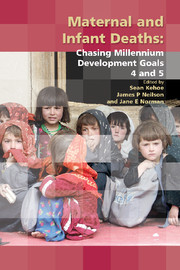Book contents
- Frontmatter
- Contents
- Participants
- Declaration of personal interests
- Preface
- The Millennium Development Goals
- SECTION 1 THE SIZE OF THE PROBLEM
- 1 The geography of maternal death
- 2 Delivering on neonatal survival to accelerate progress for Millennium Development Goal 4
- 3 Beyond the Numbers: reviewing maternal deaths and disabilities to make pregnancy safer
- 4 Human resource challenges
- SECTION 2 CLINICAL PROBLEMS AND SOLUTIONS – MATERNAL
- SECTION 3 CLINICAL PROBLEMS AND SOLUTIONS – NEONATAL
- SECTION 4 TRAINING AND DEVELOPMENT
- SECTION 5 SPECIFIC CHALLENGES IN SPECIFIC COUNTRIES
- SECTION 6 CONSENSUS VIEWS
- Index
1 - The geography of maternal death
from SECTION 1 - THE SIZE OF THE PROBLEM
Published online by Cambridge University Press: 05 February 2014
- Frontmatter
- Contents
- Participants
- Declaration of personal interests
- Preface
- The Millennium Development Goals
- SECTION 1 THE SIZE OF THE PROBLEM
- 1 The geography of maternal death
- 2 Delivering on neonatal survival to accelerate progress for Millennium Development Goal 4
- 3 Beyond the Numbers: reviewing maternal deaths and disabilities to make pregnancy safer
- 4 Human resource challenges
- SECTION 2 CLINICAL PROBLEMS AND SOLUTIONS – MATERNAL
- SECTION 3 CLINICAL PROBLEMS AND SOLUTIONS – NEONATAL
- SECTION 4 TRAINING AND DEVELOPMENT
- SECTION 5 SPECIFIC CHALLENGES IN SPECIFIC COUNTRIES
- SECTION 6 CONSENSUS VIEWS
- Index
Summary
Introduction
The great blot on public health administration
By 1905, the majority of deaths during pregnancy and childbirth in England and Wales were registered officially and the maternal mortality ratio (MMR) was around 420 deaths per 100000 live births. Lack of progress in reducing this mortality during the period up to the mid-1930s was a cause of great concern and indeed shame to health authorities, as indicated in the quotation above from the then Minister of Health. Awareness of this stalled progress also contributed to a wider public outrage over the poor state of maternal and infant welfare.
By 2005, at least 75% of maternal deaths in the developing world went unrecorded and the estimated magnitude was 450 deaths per 100000 live births. The outcry against this modern-day disgrace has become louder since 2000, when the Millennium Declaration pledged wide-scale reductions in maternal mortality as one of eight Millennium Development Goals (MDGs) agreed by an unprecedented concord of 198 nation states. Further momentum has gathered through national and international advocacy for safe motherhood, such as through the White Ribbon Alliance5 and the Partnership for Maternal, Newborn and Child Health.
The similarities between the contemporary movement to prevent maternal deaths and the lay committees set up in Britain in the 1930s to lobby for greater attention are striking in many ways. However, there are also major differences, some of which highlight bleak prospects for achieving MDG 5.
- Type
- Chapter
- Information
- Maternal and Infant DeathsChasing Millennium Development Goals 4 and 5, pp. 3 - 28Publisher: Cambridge University PressPrint publication year: 2010
- 1
- Cited by

